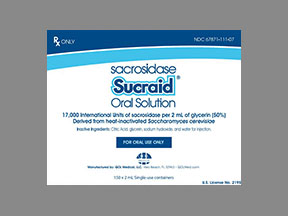
Sucraid Coupons & Savings Card – Discount Prices from $5142.39
My prescription
Edit
118ML of 8500UNIT/ML, Sucraid (1 Bottle)
Select pharmacy

Albertsons
$5142.39
COUPON PRICE
Walmart
$5145.75
COUPON PRICE
Walgreens
$5156.74
COUPON PRICESucraid savings card
Show this card to your pharmacist
Albertsons
$5142.39
BIN
ID
PCN
GRP
019876
LH0A6B91BE
CHIPPO
LHX
Powered by
Related enzyme replacement therapies prescriptions
More prescriptions for nutritional deficiency
Related enzyme replacement therapies prescriptions
More prescriptions for nutritional deficiency
Price history for Sucraid
1 Bottle, 118ML of 8500UNIT/ML
Average retail price for Sucraid
Average SaveHealth price for Sucraid
Our price history data is based on aggregated prescription data collected from participating pharmacies in America. Our prescription data updates daily to reflect the latest price changes. If you notice a missing data point, it means there wasn't sufficient data available to generate a monetary value for that date.
*Retail prices are based on pharmacy claims data, and may not be accurate when we don't have enough claims.
Sucraid dosage forms
Dosage Quantity Price from Per unit 118ML of 8500UNIT/ML 1 Bottle $5142.39 $5142.39 118ML of 8500UNIT/ML 2 Bottles $10277.28 $5138.64 118ML of 8500UNIT/ML 3 Bottles $15412.16 $5137.39
| Dosage | Quantity | Price from | Per unit |
|---|---|---|---|
| 118ML of 8500UNIT/ML | 1 Bottle | $5142.39 | $5142.39 |
| 118ML of 8500UNIT/ML | 2 Bottles | $10277.28 | $5138.64 |
| 118ML of 8500UNIT/ML | 3 Bottles | $15412.16 | $5137.39 |
What is Sucraid prescribed for?
Sucraid is prescribed for the treatment of congenital sucrase-isomaltase deficiency (CSID), a condition where the body lacks the enzyme needed to break down certain sugars. This medication helps improve the digestion of sucrose and starches in individuals with this deficiency.
Does Sucraid really work?
Sucraid (sacrosidase) is an enzyme replacement therapy used to help individuals with congenital sucrase-isomaltase deficiency (CSID) digest sucrose. Clinical studies and patient reports indicate that Sucraid can be effective in reducing symptoms such as diarrhea, abdominal pain, and bloating associated with the ingestion of sucrose in individuals with CSID. However, the effectiveness can vary from person to person, and it is important for patients to follow their healthcare provider's guidance regarding its use.
Is there an alternative to Sucraid?
Yes, an alternative to Sucraid (sacrosidase) for individuals with congenital sucrase-isomaltase deficiency (CSID) may include dietary modifications to limit or avoid sucrose and starch intake. Additionally, enzyme replacement therapy with other digestive enzymes might be considered, but it is important to consult with a healthcare provider to determine the most appropriate treatment plan based on individual needs.
What foods does Sucraid help with?
Sucraid is an enzyme replacement therapy that helps individuals with congenital sucrase-isomaltase deficiency (CSID) digest sucrose and some starches. It assists in the digestion of foods containing sucrose, such as table sugar, fruits, and certain vegetables, as well as foods with starches that require isomaltase for digestion.
How much does Sucraid cost without insurance?
The cost of Sucraid without insurance can vary significantly depending on the pharmacy and location. On average, the price for a supply of 118 milliliters can range from approximately $1,500 to $2,000. It is advisable to check with local pharmacies for the most accurate pricing and to inquire about any available discounts or patient assistance programs.
